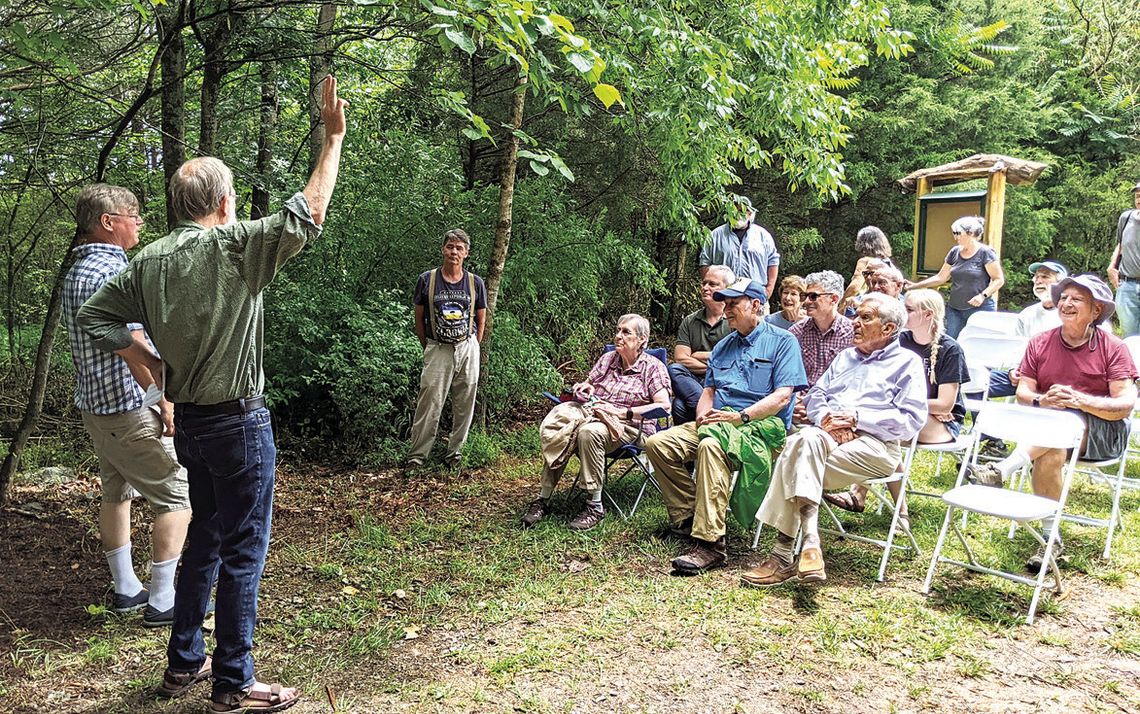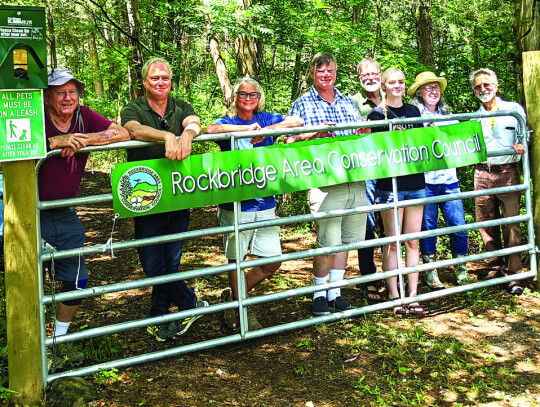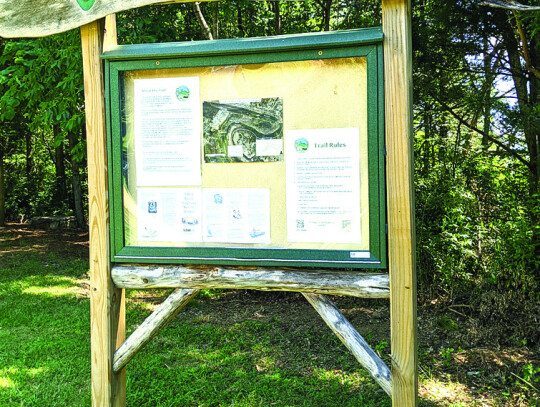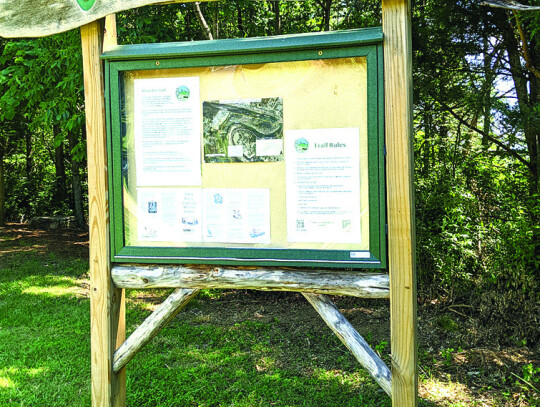The Uncas Trail in East Lexington is open to the public, with several new trail amenities installed and more coming. A festive dedication ceremony was held at the trailhead on Sunday afternoon, July 9. The approximately 0.6-mile path leads from a parking area off Shop Road through a 39-acre property of protected woodlands and limestone down to a beach on the Maury River. The trail is open dawn to dusk for walking, biking and riverside visits. A list of trail rules is posted in a kiosk at the entrance to the trail.
The property is owned by Andy McThenia and protected through conservation easements held by Rockbridge Conservation (formerly known as Rockbridge Area Conservation Council) and the Virginia Outdoors Foundation. The dedication was hosted by RC, which holds the easement specifically for the trail and works in collaboration with the owner to make improvements.
Two years ago, Rockbridge Conservation received a $12,000 grant from the VOF’s GO (Get Outdoors) program for trail improvements. So far these include a well-maintained gravel parking area, the rusticstyle kiosk crafted by the late wood sculptor Devon Malore, a new entrance gate to discourage unauthorized vehicles, and a pet waste station. A bike rack will soon be installed at the entrance and a picnic table on the beach. The trail entrance has been mulched, and grass and weeds are mown regularly by volunteers.
According to VOF information found online, the 2021 round of the GO program “focuses on projects in communities that have been inadequately served, overlooked or harmed by unfair zoning, housing and land-use practices or other systemic discrimination.”
In applying for the grant, Rockbridge Conservation noted that the East Lexington community has been underserved, lacking the playgrounds and parks found in other parts of the city and being cut off from the rest of Lexington by the U.S. 11 bypass. To build neighborhood support for the trail, Chris Wise and other members of RC’s trails and owned lands committee distributed about 70 printed invitations to the dedication ceremony to nearby homes. The invitations included a map and other information.
Attending the dedication event were Andrew W. “Uncas” McThenia, a retired Washington and Lee law professor for whom the trail was named by his son, Andy, and several other members of the McThenia family, including Andy, a hydrogeologist living in Florida, and his sister, Paige McThenia, a judge in Mecklenburg County, N.C. Others attending included Rockbridge Conservation representatives, two members of the Lexington Planning Commission, friends of Uncas McThenia and a handful of longtime trail volunteers and neighbors.
Greeting the gathering, Lee Merrill of RC thanked Andy McThenia for his “inspiration” in placing his property in a conservation easement and establishing the trail. He also thanked the city of Lexington for supporting the establishment of the easement and the public works department for mowing the old landfill cap next to the property. Also thanked were Horace Douty and Frankie Camden for their years of mowing along the trail (even prior to the trail’s formal establishment) and Shelby Clements for grading and clearing the public way down to the river. A final word was given to Malore, who made the kiosk “a thing of artful beauty.”
Andy McThenia recalled that this particular area of woods and rocky cliffs along the river had been the backdrop of his youth, as he spent hours exploring the river near his home in Lexington.
Later, when the riverside property came up for auction, he wanted to buy it but had little money, so he went to his father for help on a potential down payment. As it happened, there were only two other bidders, both of whom dropped out after the inexperienced Andy made a sudden jump in his offer.
Now, as owner of the land, McThenia began to think about how to manage it. Early on, W&L biology professor John Knox made a biological assessment of the land, finding that a rare plant, the three-flower melic grass (Melica nitens), grew there. McThenia began to consider a conservation easement, but was told that the property was too small. Learning this was not the case, he started his application, resulting in what he termed “a long battle with the city.” The application was eventually successful. Then, with a “public entity” required to hold the easement rights to the trail, Rockbridge Conservation stepped in, resulting in a “legal, perpetually conserved trail in an easement for the public to enjoy.”
McThenia’s “long battle” started in July 2017, when he first submitted his easement application to the Planning Commission. Two meetings were held in succession, with many citizens commenting in support, including Chris Wise of RC, who said that the conserved land would “make the rest of the neighborhood a very desirable place to live,” and neighbor Elizabeth Daystar, who called the property “a very special place,” where her family had seen wild turkey, foxes and even a cougar. She had also found trash, including large kitchen appliances, apparently thrown onto the property instead of the old adjacent city landfill.
On Aug. 2, 2017, a split Commission voted in favor of the application, overriding the staff planning director’s objection that conservation easements were inconsistent with the city’s current comprehensive plan. At that meeting, McThenia provided his first detailed description of a proposed public trail through the property and down to the river. In late August, City Council rejected the application, deciding that conservation easements did not fit the comprehensive plan.
McThenia did not give up. In early 2018 he told this newspaper that he wanted to work with RC and others to add conservation easements to the comprehensive plan, which was due for revision that year. By late summer, the revised plan allowed the easements in certain parts of the city and under certain conditions. One type of easement explicitly would provide public river access. In September, Council unanimously approved the changes, opening the door to VOF’s acquisition of the easement.
More good news followed. In late 2019, Governor Northam’s office announced a Virginia Land Conservation Fund grant of $180,000 to be used by VOF to purchase the easement on the McThenia property, including the public trail and river access.
“The property fronts the Maury for over 5,700 feet and has a natural beach-like area at the foot of the trail,” the press release noted.
The property also lies within the Lexington Barrens and Bluffs conservation site and contains several sinkholes “that serve to capture most of the surface-water runoff in the upland portion of the property.” Also cited was the rare plant professor Knox had found early on: the three-flower melic grass.
.jpg)







